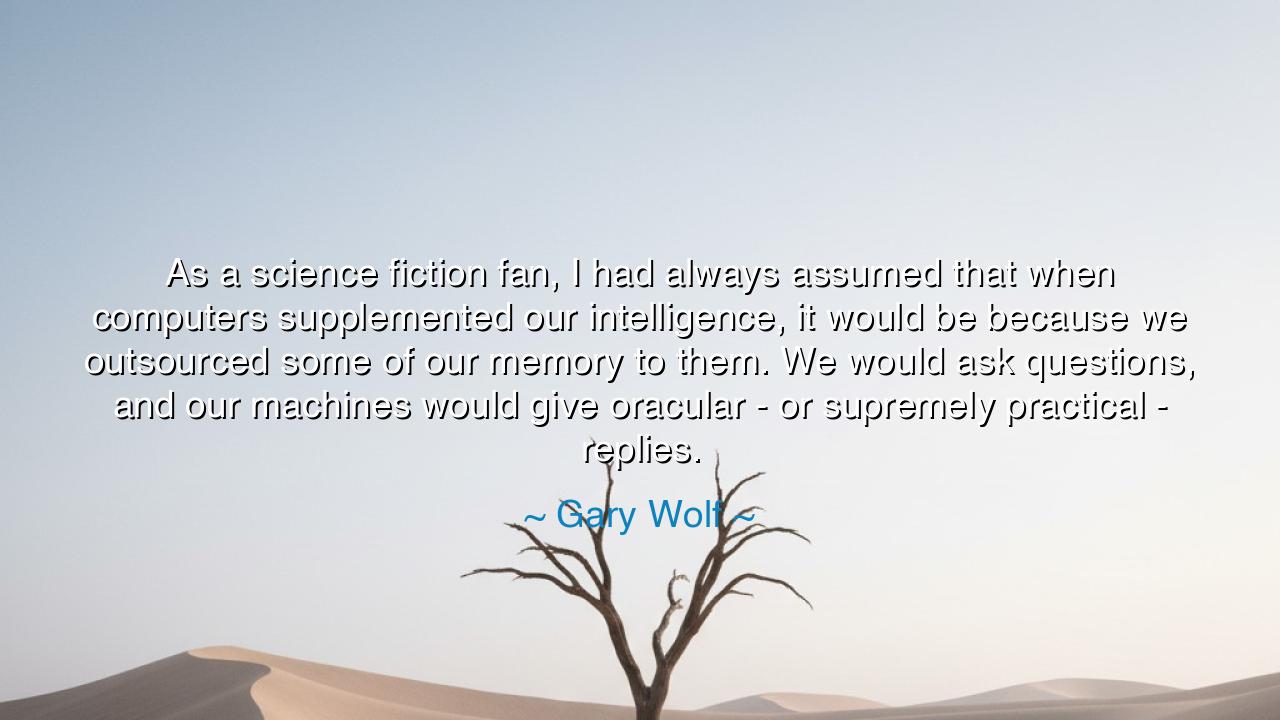
As a science fiction fan, I had always assumed that when
As a science fiction fan, I had always assumed that when computers supplemented our intelligence, it would be because we outsourced some of our memory to them. We would ask questions, and our machines would give oracular - or supremely practical - replies.






“As a science fiction fan, I had always assumed that when computers supplemented our intelligence, it would be because we outsourced some of our memory to them. We would ask questions, and our machines would give oracular — or supremely practical — replies.” Thus wrote Gary Wolf, the chronicler of the digital age, whose words carry both wonder and warning. In his reflection, he captures the spirit of an era in which humankind has begun to weave its destiny with the threads of silicon and code. His voice, half awed and half uneasy, recalls the timeless struggle between creation and creator, between the dream of progress and the fear of what that progress may awaken.
In the ancient days, the Greeks spoke of the Oracle of Delphi — a priestess through whom the voice of the divine would speak. Kings, philosophers, and warriors would journey across mountains to hear her cryptic wisdom, for they believed she channeled knowledge beyond human reach. Wolf’s vision mirrors this old myth in modern form: the computer as a new oracle, an entity to which we turn for answers that once came from gods, prophets, and elders. But unlike the temple priestess, this oracle is made not of flesh or faith, but of circuits and algorithms. It does not inhale the vapors of the sacred mountain; it breathes data, infinite and invisible.
Wolf, a disciple of science fiction, dreamed of a world where man and machine would coexist in harmony — the machine serving as a wise companion, expanding the reach of human thought. He imagined that when we outsourced our memory to these devices, we would gain time to ponder greater mysteries. No longer would we carry the burden of remembering every fact; instead, we would climb higher in the tower of imagination, while our creations faithfully answered our questions with oracular precision or practical clarity. But reality, as he discovered, was both stranger and subtler. The machine became not merely our servant, but our mirror — reflecting back to us the confusion, curiosity, and contradictions of our own minds.
Think of Alan Turing, the father of modern computing, who dreamed that a machine could think — not as a god, but as a human. He imagined intelligence as something mechanical, measurable, replicable. Yet even he, brilliant as he was, could not foresee the intimacy that would grow between man and machine — how our devices would become extensions of our memory, our voices, even our emotions. We have indeed outsourced our minds — not just to the computer on the desk, but to the phone in our pocket, the cloud above us, the algorithm that knows what we desire before we do. And so Wolf’s reflection stands as prophecy fulfilled — and questioned.
For the oracles of today do not merely answer; they shape the questions we ask. Their replies, though precise, carry no soul. The machine’s wisdom is vast, but without virtue; its logic flawless, yet without compassion. We have gained knowledge but lost silence; gained speed but risked reflection. Wolf’s words remind us that in seeking to amplify our intelligence, we must not let it replace our humanity. The ancient oracles spoke in riddles because they knew that truth must be earned, not downloaded. The new oracles, by contrast, give us answers too easily — and thus we forget how to wonder.
Yet there is beauty still in what we have built. Just as fire, once feared, became the servant of civilization, so too can the computer be the ally of wisdom — if guided by heart. The key lies not in what the machine gives, but in what the human asks. The oracle speaks, yes, but it is the seeker’s soul that gives meaning to its words. To ask rightly is the art we must not lose — the art of discernment, of curiosity joined with conscience.
So, O child of the digital dawn, remember Wolf’s insight: knowledge without understanding is hollow, and power without purpose is peril. Use your machines, but do not worship them. Let them store your memories, but never your morality. Let them offer answers, but do not forget how to ask questions that reach beyond the circuits — questions of love, of meaning, of truth. For only the human spirit, guided by humility, can turn data into wisdom.
Thus, when you next face your glowing oracle, remember that it does not see, it calculates; it does not dream, it processes. Let your heart be the interpreter of its answers, as the priestess once was for Apollo’s voice. And in doing so, you will fulfill Gary Wolf’s vision — not as a servant of machines, but as their master and companion, ensuring that the light of human understanding shines brighter than the glow of any screen.






AAdministratorAdministrator
Welcome, honored guests. Please leave a comment, we will respond soon